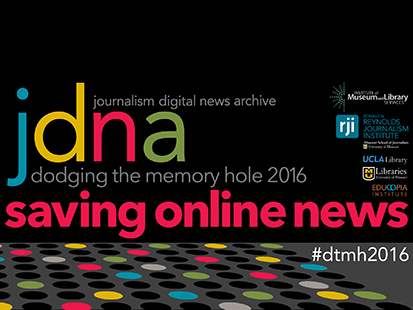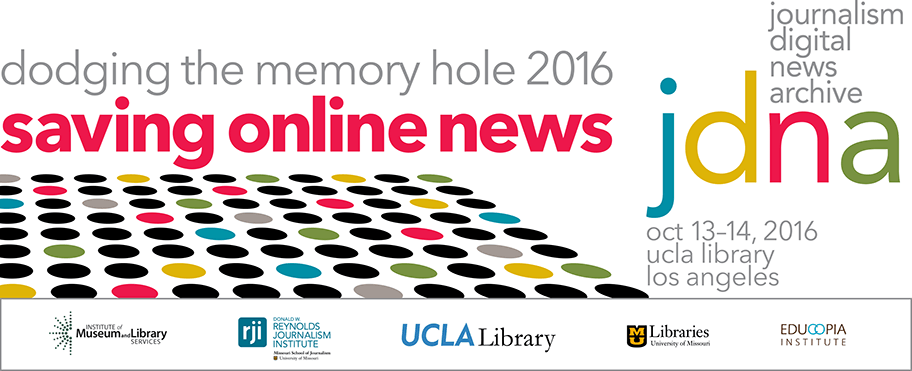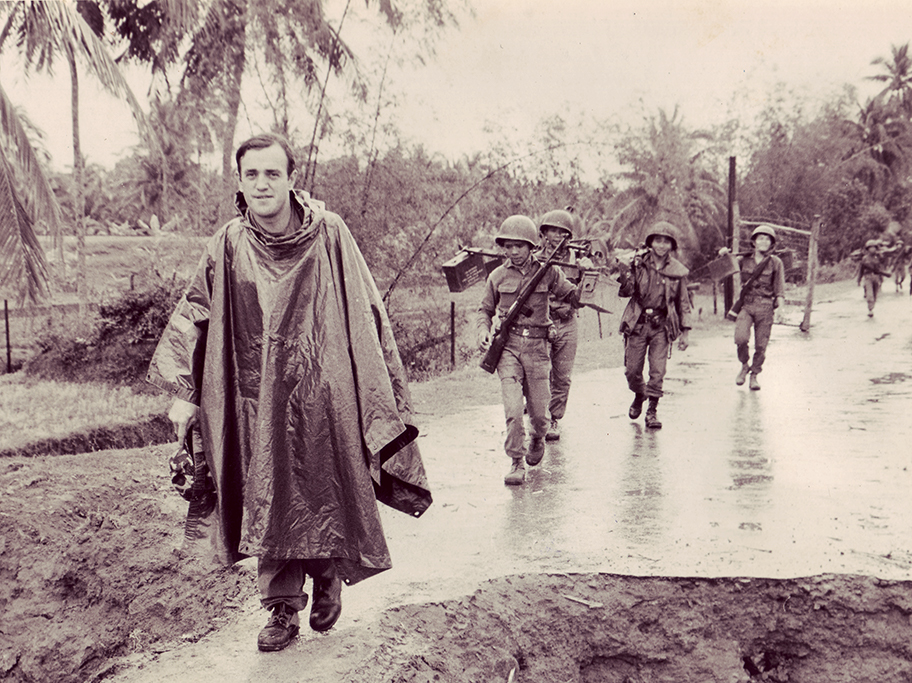
Dodging the Memory Hole 2016: Saving Online News
On Oct. 13–14, 2016, JDNA joined with the UCLA Libraries and the Educopia Institute to present “Dodging the Memory Hole 2016: Saving Online News,” where presentrs and attendees explored solutions to the most urgent threat to cultural memory today — the loss of online news content. Journalistic content, published on websites and through social media channels, is fragile and easily lost in a tsunami of digital content. Join other professional journalists, librarians, archivists, technologists and entrepreneurs in addressing the urgent need to save the first rough draft of history in digital form.
The two-day forum — hosted by the Donald W. Reynolds Journalism Institute’s Journalism Digital News Archive (JDNA), UCLA Library and the Educopia Institute — featured thought leaders, stakeholders and digital preservation practitioners who are passionate about preserving born-digital news. Sessions updated attendees about existing initiatives, examine critical issues and create a national agenda for protecting online journalism.
About the Dodging the Memory Hole series
This is the fourth event in the DTMH conference series focusing on preserving born-digital news content. Its name, Dodging the Memory Hole, comes from George Orwell’s “1984,” in which photographs and documents conflicting with “Big Brother’s” narrative were tossed into a “memory hole” and destroyed. Today’s memory hole is largely the unintentional result of technological systems not designed to keep information for the long term. The previous three events were held at the Reynolds Journalism Institute at the University of Missouri and the Charlotte Mecklenburg Public Library in Charlotte, North Carolina and the U.S. Capitol Building, Washington, D.C.
For more information about the Journalism Digital News Archive and how you can help save the “first rough draft of history,” like us on Facebook, follow us on Twitter, follow us on LinkedIn or sign up for our Dodging the Memory Hole newsletter.
Terry Britt: Saving the future past: Digital news content archiving
Terry Britt of Sweetwater, Tennessee, is a doctoral candidate studying journalism at the University of Missouri in Columbia. His paper deals with deterioration of collective memory over time. Alongside a review of relevant literature on the challenges of media content preservation, both pre-digital and born-digital, and efforts toward that end, responses from a recent qualitative … Continued
Mat Kelly: Final Report—Dodging the Memory Hole
Mat Kelly of LaBelle, Florida, is a doctoral candidate studying computer science at Old Dominion University in Norfolk, Virginia. His project addresses the need to provide individuals with ways to collect, archive and access news content they perceive as important. Kelly’s work is intended to supplement the large-scale collection work being done by institutions such … Continued
Jiwon Choi: Eliminating the border of digital news archiving
Jiwon Choi of Osan, South Korea, is studying convergence journalism at the University of Missouri in Columbia. Her PowerPoint project addresses obstacles and solutions to online news archives for international media. Her project includes a literature review of the topic as well as a panel of international students from MU who explored and discussed the … Continued
Itza Carbajal: Web archivability: A pathway towards dialogue
Itza Carbajal of New Orleans, Louisiana, is an information studies scholar at the University of Texas in Austin. Her research paper examines web archivability, the measurement of how easily a website’s components — including structure, presentation, content and functionality — can be saved for future access and use. It proposes the “incorporation of the concept of … Continued
Shawn Jones: Indicators that tweeting may improve the detection of news articles for web archives
Shawn Jones of Virginia Beach, Virginia, is a computer science student at Old Dominion University in Norfolk, Virginia. His project, titled “Indicators That Tweeting May Improve The Detection Of News Articles For Web Archives,” explores the potential relationship between social media sharing of news articles and how quickly those articles are identified by web crawlers … Continued
Clifford Lynch: Born-digital news preservation in perspective
Scroll to view transcript CLIFFORD LYNCH: [00:09] I’ll ask a little indulgence because I’m going to start in a place that may sound strange. It’s not with the news at all. It’s with the world of scholarly academic journals and the challenge that we face there. Same challenge: how do you preserve this body of … Continued
Kate Zwaard: Technology and community: Why we need partners, collaborators, and friends
Scroll to view transcript KATE ZWAARD: [00:07, Slide 1]: I just want to start with a quick caveat that I’m not here talking on behalf of the Library of Congress when I’m expressing my personal opinions. I’m using experience that I learned there. I’ll be talking about a few things that I think, and it’s … Continued
Peter Arnett: Saving the AP Saigon bureau archives
Read War stories: How Peter Arnett’s efforts to save Saigon articles inspire today’s preservation efforts PETER ARNETT: [00:04] When, a few months ago, Ed invited me to join this conference, I immediately accepted because information gathering in the field and access to research materials, particularly historical data, had been an integral part of my 50-year … Continued
War stories: How Arnett’s efforts to save Saigon articles inspire today’s preservation efforts
I’m no hero-worshiper, far from it. Yet there are people who I admire, people who have certain principles along with the courage of their convictions. A number of such commendable individuals joined us at the Dodging the Memory Hole: Saving Online News forum last month at UCLA. Among them was journalist Peter Arnett, who won … Continued


